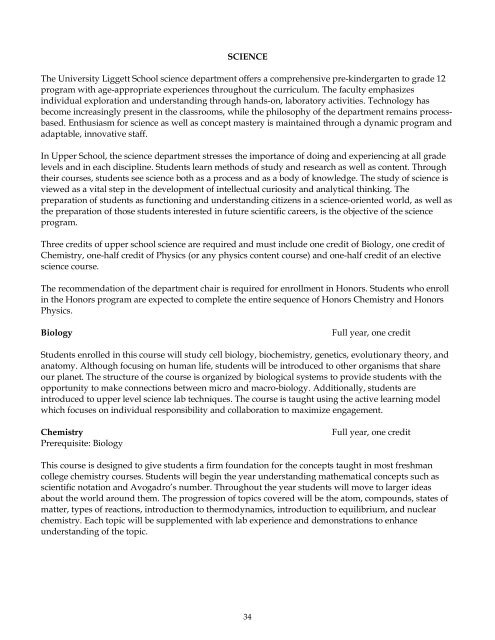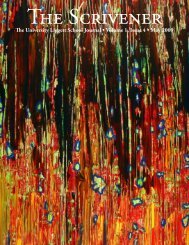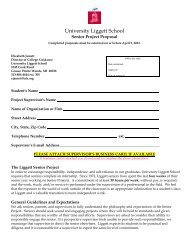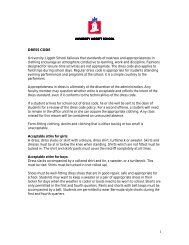2012-13 upper school course description book - University Liggett ...
2012-13 upper school course description book - University Liggett ...
2012-13 upper school course description book - University Liggett ...
Create successful ePaper yourself
Turn your PDF publications into a flip-book with our unique Google optimized e-Paper software.
SCIENCE<br />
The <strong>University</strong> <strong>Liggett</strong> School science department offers a comprehensive pre-kindergarten to grade 12<br />
program with age-appropriate experiences throughout the curriculum. The faculty emphasizes<br />
individual exploration and understanding through hands-on, laboratory activities. Technology has<br />
become increasingly present in the classrooms, while the philosophy of the department remains processbased.<br />
Enthusiasm for science as well as concept mastery is maintained through a dynamic program and<br />
adaptable, innovative staff.<br />
In Upper School, the science department stresses the importance of doing and experiencing at all grade<br />
levels and in each discipline. Students learn methods of study and research as well as content. Through<br />
their <strong>course</strong>s, students see science both as a process and as a body of knowledge. The study of science is<br />
viewed as a vital step in the development of intellectual curiosity and analytical thinking. The<br />
preparation of students as functioning and understanding citizens in a science-oriented world, as well as<br />
the preparation of those students interested in future scientific careers, is the objective of the science<br />
program.<br />
Three credits of <strong>upper</strong> <strong>school</strong> science are required and must include one credit of Biology, one credit of<br />
Chemistry, one-half credit of Physics (or any physics content <strong>course</strong>) and one-half credit of an elective<br />
science <strong>course</strong>.<br />
The recommendation of the department chair is required for enrollment in Honors. Students who enroll<br />
in the Honors program are expected to complete the entire sequence of Honors Chemistry and Honors<br />
Physics.<br />
Biology<br />
Full year, one credit<br />
Students enrolled in this <strong>course</strong> will study cell biology, biochemistry, genetics, evolutionary theory, and<br />
anatomy. Although focusing on human life, students will be introduced to other organisms that share<br />
our planet. The structure of the <strong>course</strong> is organized by biological systems to provide students with the<br />
opportunity to make connections between micro and macro-biology. Additionally, students are<br />
introduced to <strong>upper</strong> level science lab techniques. The <strong>course</strong> is taught using the active learning model<br />
which focuses on individual responsibility and collaboration to maximize engagement.<br />
Chemistry<br />
Prerequisite: Biology<br />
Full year, one credit<br />
This <strong>course</strong> is designed to give students a firm foundation for the concepts taught in most freshman<br />
college chemistry <strong>course</strong>s. Students will begin the year understanding mathematical concepts such as<br />
scientific notation and Avogadro’s number. Throughout the year students will move to larger ideas<br />
about the world around them. The progression of topics covered will be the atom, compounds, states of<br />
matter, types of reactions, introduction to thermodynamics, introduction to equilibrium, and nuclear<br />
chemistry. Each topic will be supplemented with lab experience and demonstrations to enhance<br />
understanding of the topic.<br />
34

















